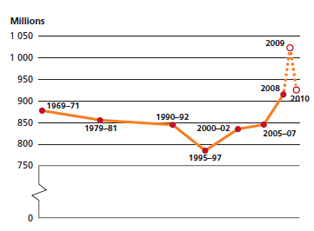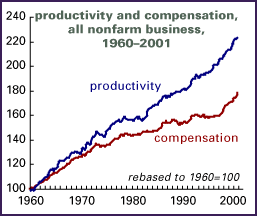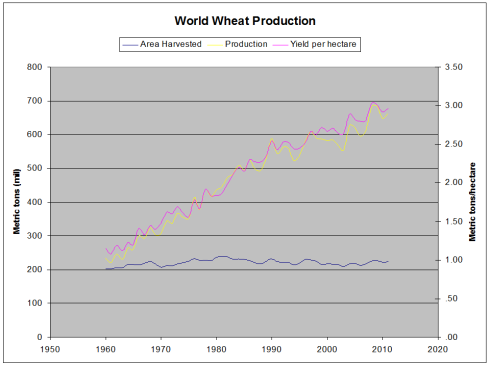Obama made waves two days ago when he asked public employees for “shared sacrifice and burden sharing,” on the grounds that they were somehow doing better off than private employees. Daily Kos showed that average compensation for public employees is less than private ones, but that comparison isn’t really the point, or at least the only point. The real howler of Obama’s speech is the implication that there has not been “shared sacrifice and burden sharing” up until now. It’s not just that public workers, even in states with Democratic governors, like New York, have already had to accept yet another round of wage and benefits cuts. The point is that, since the late 1960s, workers in general have been keeping hold of less and less of what they produce. Doug Henwood’s ‘productivity wedge’ shows the growing gap between productivity and compensation:
Henwood’s graph shows the gap in terms of overall compensation (wages plus benefits). As the graph below demonstrates, the gap between productivity and compensation is largely in terms of flatlining real wages:
Asking workers to sacrifice benefits, on top of stagnating wages, is just piling on. And it misses the point that most workers have been “burden and sacrifice sharing” for more than thirty years. Obama’s typically tone deaf appeal used almost exactly the same language as managers and CEOs used during the labor battles of the 70s and 80s. The promise then, of course, was that, if workers worked harder, increased their productivity, and sucked it up then, then they would reap gains sometime in the future.
We can find a similar mismatch between productivity and real gains on a global scale. Consider the relationship between food production and malnourishment. Below is data showing the enormous increase in productivity in wheat. It shows that the amount of land dedicated to world wheat production has remained flat, while wheat production dramatically increased:
In 2011, enough wheat was produced to make 405 loaves of bread per person per year. Or, just over one loaf per person per day (our calculations, and graph based on data taken from the USDA). Yet, as this graph from the UN Food and Agriculture Association shows, during the same time span global undernourishment has increased:
 We have more than enough to feed the global population, yet about one in six does not get enough to eat. Wheat production is a very crude measure of the ability to meet global food needs generally. But it speaks to the basic point: increased productivity has not gone hand in hand with the satisfaction of human needs.
We have more than enough to feed the global population, yet about one in six does not get enough to eat. Wheat production is a very crude measure of the ability to meet global food needs generally. But it speaks to the basic point: increased productivity has not gone hand in hand with the satisfaction of human needs.
What holds together the facts about food/absolute poverty and the facts about wages/compensation is the story they tell about productivity and power. The burden sharing and shared sacrifice of the past thirty to forty years has been decidedly one-sided. Increased productivity has come at the price of belt-tightening by those who can least afford it. The real story of the past decades, then, is not increased productivity so much as the declining ability of workers and those in need to capture even a decent share of what is so efficiently produced. Perhaps a further lesson is that one should distrust a request for sacrifice today in the name of future gains. All that seems to translate into is a long-run weakening of a worker’s ability to lay claim to what he or she produces.




I get the first half of the post about wages and productivity.
The second half about food seems a bit confused to me. I’m sure you appreciate food is itself a big and complicated subject, but here are two quick points.
First, world population has increased from 3.6bn in 1970 to 6.7bn in 2009. So even taking the malnutrition spike in 2009 as the end point, undernourishment has fallen from 24% in 1970 to 15% in 2009.
Second, the dynamics that keep wages down seem different to those responsible for hunger. Amongst the bottom billion on your FAO chart the leading cause of hunger is conflict and lack of roads. If those problems were solved then the most severe hunger could be abolished without the ruling class having to make any direct sacrifice. That’s not the case with
wages vs. profits.
For those who are not malnourished but not so much above that line (the bulk being workers in the developing world with some of the poor in the developed world) the amount of food is more directly affected by wage levels. Here raising consumption (and there has been a large rise in consumption in e.g. China) is a matter of trade offs.
Of course this maybe one reason that it is much more popular to focus on the bottom billion than the middle billions. Most of the very hungary are subsistence farmers who can lay claim to more of what they produce than most – that’s not their problem. Everyone (except maybe a few greens) can get behind turning the poorest into productive wage workers. What happens next is more controversial.
Guess when we left the gold standard.
This has nothing to do with the Gold Standard — the timing is coincidental. The only explanation I’m coming up with so far is a loss of labor clout relative to owners. Labor doesn’t have the power to demand that productivity gains be passed along to them in the form of higher wages.
There’s an updated graph here: http://econographics.wordpress.com/2013/03/19/labor-productivity-vs-real-hourly-compensation/
It was the birth of neo-liberalsim. The Start of the globalism craze. America and the UK practice no-holds-barred globalism.
Multinationals (born from globalism) rule the world now. They operate in the international sphere, some of them have more economic power than countries, and as such they go from one country to another dictating labor laws and taking advantage of loose laws. They also benefit from monopsony.
Because of the cheap labor they now have access to, it depresses wages here. Traditional capitalism with the independent businesses never had access to these foreign labor supplies like multinationals do. Hence its a golden age for multinationals and independent business are kinda the red headed step child.
Globalism was what broke the wage-productivity bargain prior to the Great Depression and was a cause of the Great Depression. Same thing happened for the Great Recession. The attempts at globalism in the early part of the twentieth century were undone by returning to protectionist policies, which are the same thing we have to undertake to fix our current problems.
Ps.
It was the power that unions grew to hold that kept wages going up. With globalism, unions were beaten down, ironically in some regards by the very liberals who helped create them. The focus around 72 shifted to individualism and unions are collective. We’ve since shifted from a manufacturing to service industry, making it harder to unionize and lower wage jobs. Plus, the media has done a good job of destroying the unions image in the eyes of Americans.
I’m not sure where you’re getting your info, but great topic.
I needs to spend some time learning much more or understanding more.
Thanks for magnificent info I was looking for this information for my mission.
Reblogged this on Scott Andrew Hutchins and commented:
Here is another example why homelessness is skyrocketing in the United States.
Why the socialist myth of the rich that are getting richer and of the poor that are getting poorer is a lie
http://www.scribd.com/doc/204810193/The-rich-are-getting-richer-and-the-poor-are-getting-poorer-Another-socialist-myth
This link goes to a private-only blog. Whoever wants to get this message across has opted for a self-defeating strategy. Not a sign of commanding intelligence, so their assessment of the ‘myth’ that the poor are getting poorer while the rich are getting richer might be a bit wrong. I was willing to give it look. But the message, clear off, this is for private members only, didn’t offer the sort of welcome I expect from well-meaning souls.
It was public when I posted the comment. For some reasons I had to change it to private. Thank you very much for the reply.
The main argument is that in recessions the average person of te 1% of the richest people become poorer at a much faster rate than the average 1% of the poorest, since the poorest 1% have no assets. And the average wage cannot fall as dramatically as the average asset.
I therefore conclude that in recessions rich become less rich faster than the poor become poorer, and in good times the rich become richer faster than the poor become less poor.
Well, good God, what an utter tragedy.
Hey There. I discovered your weblog using msn.
This is a really smartly written article. I will be sure to bookmark it and come back
to read more of your helpful info. Thanks for the post.
I will definitely comeback.